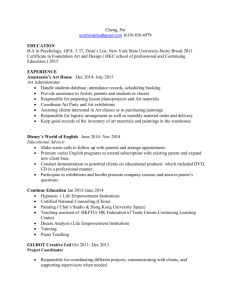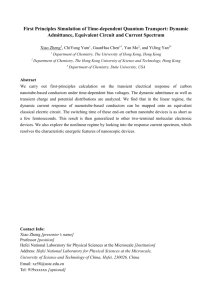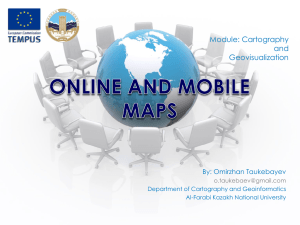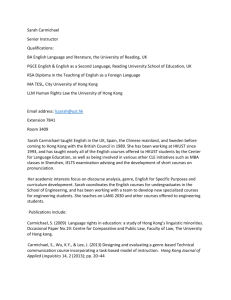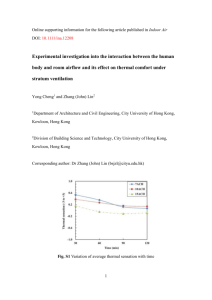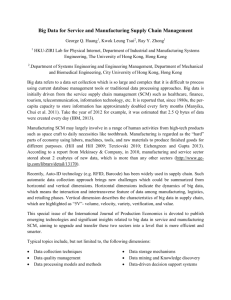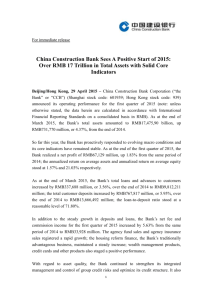Word Format
advertisement
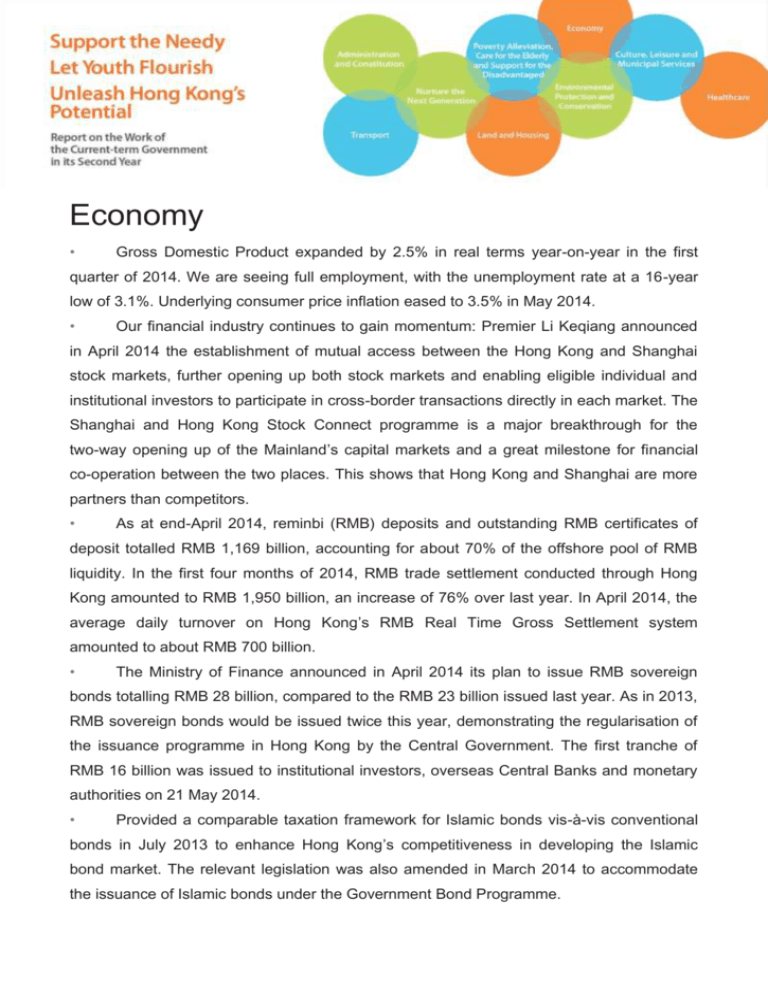
Economy • Gross Domestic Product expanded by 2.5% in real terms year-on-year in the first quarter of 2014. We are seeing full employment, with the unemployment rate at a 16-year low of 3.1%. Underlying consumer price inflation eased to 3.5% in May 2014. • Our financial industry continues to gain momentum: Premier Li Keqiang announced in April 2014 the establishment of mutual access between the Hong Kong and Shanghai stock markets, further opening up both stock markets and enabling eligible individual and institutional investors to participate in cross-border transactions directly in each market. The Shanghai and Hong Kong Stock Connect programme is a major breakthrough for the two-way opening up of the Mainland’s capital markets and a great milestone for financial co-operation between the two places. This shows that Hong Kong and Shanghai are more partners than competitors. • As at end-April 2014, reminbi (RMB) deposits and outstanding RMB certificates of deposit totalled RMB 1,169 billion, accounting for about 70% of the offshore pool of RMB liquidity. In the first four months of 2014, RMB trade settlement conducted through Hong Kong amounted to RMB 1,950 billion, an increase of 76% over last year. In April 2014, the average daily turnover on Hong Kong’s RMB Real Time Gross Settlement system amounted to about RMB 700 billion. • The Ministry of Finance announced in April 2014 its plan to issue RMB sovereign bonds totalling RMB 28 billion, compared to the RMB 23 billion issued last year. As in 2013, RMB sovereign bonds would be issued twice this year, demonstrating the regularisation of the issuance programme in Hong Kong by the Central Government. The first tranche of RMB 16 billion was issued to institutional investors, overseas Central Banks and monetary authorities on 21 May 2014. • Provided a comparable taxation framework for Islamic bonds vis-à-vis conventional bonds in July 2013 to enhance Hong Kong’s competitiveness in developing the Islamic bond market. The relevant legislation was also amended in March 2014 to accommodate the issuance of Islamic bonds under the Government Bond Programme. • The new Companies Ordinance came into effect in March 2014 to provide a modernised legal framework for the incorporation and operation of over 1.2 million companies in Hong Kong. It enhances corporate governance, ensures better regulation and facilitates business to consolidate Hong Kong’s position as an international business and financial centre. • Amended the Inland Revenue Ordinance in March 2014 to reduce by half the profits tax rate for a captive insurer’s insurance business of offshore risks. • Introduced the Insurance Companies (Amendment) Bill 2014 in April 2014 to provide a legal framework for establishing an independent Insurance Authority and a statutory licensing regime for insurance intermediaries, to enhance the protection of millions of policyholders. • To launch a public consultation in June 2014 on the proposal of including in each mandatory provident fund scheme a core fund, with fee control, as the default fund. The proposal would assist employees in choosing low-fee funds consistent with the concept of retirement protection, increase market competition and facilitate fee reduction. • Established the Consultative Committee on Economic and Trade Co-operation between Hong Kong and the Mainland in October 2013 to provide concrete recommendations to the Hong Kong Special Administrative Region Government (HKSARG) on matters relating to the strengthening of co-operation with the Mainland in economic, trade and other relevant areas. • Established the fifth Mainland Office in Wuhan in April 2014. A liaison unit in the Northern Region of the Mainland would also be set up this year, to be followed by another one in the Eastern Region next year, to assist Hong Kong residents and enterprises in capitalising on development opportunities in the Mainland. • Signed a Co-operation Agreement with the Qianhai Authority of Shenzhen in September 2013 to facilitate the direct practice of Hong Kong professionals and enterprises of the construction and engineering sectors in Qianhai. • The CEPA Joint Working Group held three meetings in Guangzhou, Shanghai and Chongqing in June 2013, December 2013 and April 2014 respectively. The meetings explored concrete measures to resolve specific policy and regulatory issues encountered by the business community in using CEPA to enter the Mainland market. The HKSARG would continue to assist the business community to make fuller and better use of CEPA. • In February 2014, the Secretary for Justice led a delegation of legal and arbitration professionals on the first two visits to the emerging markets of South East Asia and to promote Hong Kong as a centre for international legal and dispute resolution services in the Asia-Pacific region. • In March 2014, the Department of Justice held its first “Mediation Week” to promote the understanding of mediation and its wider use as a means of dispute resolution. The “Mediate First” pledge has been signed by about 160 companies and organisations so far, and they pledge to consider the use of mediation first before resorting to other means of dispute resolution. • Further extended the application period of the special concessionary measures under the “SME Financing Guarantee Scheme” to end-February 2015 to continue assisting local enterprises obtain commercial loans. At end-May 2014, more than 8 700 applications had been approved with a total loan guarantee amount of more than $29 billion. • Reduced the Business Registration Certificate levy from $450 to $250 per annum in July 2013 to benefit small and medium enterprises. • Established the Lantau Development Advisory Committee in January 2014 to map out the economic and social development strategy for Lantau Island to fully capitalise on the benefits brought by major infrastructure in the area and enhance synergy between Hong Kong and the Pearl River Delta. • Set up the $500 million Sustainable Fisheries Development Fund in January 2014 to support programmes and research that help enhance the competitiveness of the fisheries industry and put its development on a sustainable path. • Updated the admission and management requirements for the List of Approved Contractors for Public Works in December 2013 to increase tendering opportunities for small to medium-sized contractors and enhance the capacity of the industry to undertake works projects. The updates would further open up the market for competitive tendering and, at the same time, enhance the quality and cost effectiveness of government infrastructure projects. • Devised an arrangement to better prepare for “Supplementary Labour Scheme” applications related to public sector works in March 2014. It aims to reduce the time required for administrative work to smooth the processing of applications. Training for local workers was strengthened to cope with the shortage of skilled workers in the construction industry. • Announced in February 2014 an additional allocation of $130 million to implement manpower development measures for the retail industry. • Launched the $100 million Maritime and Aviation Training Fund in April 2014 to build a diversified and competitive pool of talent to boost Hong Kong’s position as an international maritime centre. • Followed up on the recommendations of the consultancy study on Enhancing Hong Kong’s Position as an International Maritime Centre, and commenced necessary preparatory work to establish a new statutory body to drive the development of Hong Kong’s maritime services industry. • Announced in January 2014 the restarting of work to set up an Innovation and Technology Bureau to promote economic development and improve people’s livelihood through innovation, science and technology. We obtained the support for the proposal from the Legislative Council (LegCo) Panel on Commerce and Industry and the Panel on Information Technology and Broadcasting. The proposed establishment changes are supported by the Establishment Subcommittee under the Finance Committee, while the Subcommittee set up under the House Committee has completed the scrutiny of the subsidiary legislation for transferring the relevant statutory functions. We hope to secure the early approvals of the LegCo so that the new Bureau can be set up and start operation as soon as possible. • Held the 2nd International IT Fest in April 2014 to showcase Hong Kong’s Information and Communications Technology (ICT) accomplishments, and foster an environment for ICT innovation and businesses to flourish. About 60 000 people participated in the International IT Fest 2014, of which around 20 000 were from the Mainland or overseas. • To promulgate the new Digital 21 Strategy – “Smarter Hong Kong, Smarter Living” – in mid-2014 as the framework for Hong Kong’s overall ICT development in the next few years. Through the new Strategy, individuals and different sectors of society can leverage on ICT to enhance quality of life as well as productivity. • Completed the second round Partner State Key Laboratories (PSKLs) application exercise with the Ministry of Science and Technology in July 2013, resulting in the increase of PSKLs in Hong Kong from 12 to 16. The first round application exercise for Hong Kong Branches of Chinese National Engineering Research Centres started in February 2014, and was open for universities and Research and Development Centres in Hong Kong to apply. • Provided annual funding of up to $4 million from 2014-15 onwards to each of the six universities designated as local public research institutions to encourage their teams to start technology businesses and commercialise research and development results. • The Steering Committee on Population Policy completed the public engagement exercise on population policy in February 2014. It is studying the comments received with a view to formulating short-, medium- and long-term measures to address the issues of ageing population and an inadequate labour supply. • Implemented the first mutual use of automated immigration clearance services (e-gate) with the Republic of Korea in December 2013 and signed a memorandum of understanding with Germany concerning the mutual use of e-gate in May 2014 to provide greater travel convenience for residents.

